There are some obvious and serious problems with anime adaptations of incomplete manga or light-novel series – I don’t think I have to elaborate beyond that. There are even more serious problems with one-cour adaptations of such stories that extend beyond a few volumes. Deadman Wonderland, alas, suffers from pretty much all of these.
The fundamental question I have to ask after watching the “finale” is, was this anything more than a 12-episode commercial for the manga? It’s a very good manga, don’t get me wrong – I highly recommend you read it. But I still hoped we would get something more for our time than that. We did get solid entertainment, no doubt, and more injustice and gore than you can shake a stick at. But is that enough from a TV series?
I can certainly hear the litany of complaints against DW. I’ve read most of them over the last three months, probably. The show is patently ridiculous. There are logic holes big enough to hide a prison in. Ganta is annoyingly weak and self-pitying. The dialogue is over the top and sappy. And you know, it’s all true. I can’t dispute any of it, but I like DW a lot in spite of all that. I might even say because of some of that.
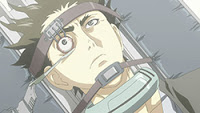 I’ve said from the beginning that you really need to empathize with Ganta in order for this story to work as it was intended. When you consider what he’s gone through at the tender age of 14, I think it’s actually a bit amazing that he isn’t more screwed up than he is. That’s the centerpiece of this whole premise – injustice and horror. Life isn’t fair for anybody, but Ganta’s had more than his share of being pissed on by the Gods of Fate. And he’s been sent to a place that really is horrible beyond comprehension. Sure, there’s a bit of social commentary in the premise of such a place. But really, this is a cartoon and Deadman Wonderland is not meant to be realistic. It’s a mythical Hell on Earth, where everything horrible and unfair that can happen does. And if you’re there, sooner or later to you.
I’ve said from the beginning that you really need to empathize with Ganta in order for this story to work as it was intended. When you consider what he’s gone through at the tender age of 14, I think it’s actually a bit amazing that he isn’t more screwed up than he is. That’s the centerpiece of this whole premise – injustice and horror. Life isn’t fair for anybody, but Ganta’s had more than his share of being pissed on by the Gods of Fate. And he’s been sent to a place that really is horrible beyond comprehension. Sure, there’s a bit of social commentary in the premise of such a place. But really, this is a cartoon and Deadman Wonderland is not meant to be realistic. It’s a mythical Hell on Earth, where everything horrible and unfair that can happen does. And if you’re there, sooner or later to you.
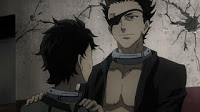 I think DW works best when you experience it on a totally emotional level, with all the intellectual circuits shut down. Each new horror brings an associated visceral reaction. People still talk about the eyeball scene with Crow, but there are plenty of other examples here. No one is off limits – not cute little children or kittens. And it might be the cute children committing the atrocities. It’s really a story that asks you to put yourself in Ganta’s place and try to confront what you would do if all these terrible things were happening to you, and not him. As much as any anime or manga I know, it’s really about how you react to it that matters.
I think DW works best when you experience it on a totally emotional level, with all the intellectual circuits shut down. Each new horror brings an associated visceral reaction. People still talk about the eyeball scene with Crow, but there are plenty of other examples here. No one is off limits – not cute little children or kittens. And it might be the cute children committing the atrocities. It’s really a story that asks you to put yourself in Ganta’s place and try to confront what you would do if all these terrible things were happening to you, and not him. As much as any anime or manga I know, it’s really about how you react to it that matters.
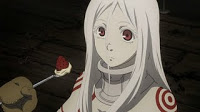
In that sense I think Manglobe did a very good job adapting this to the screen. In a remarkably successful way they captured the horror inherent in the manga. In some cases the scenes were even more jarring in the anime, which is remarkable – though others were toned down just a bit. In fact, I find it surprising that things weren’t toned down more than they were, but thank goodness. A neutered version of this story would have been a laughable failure.
Where DW was less successful as an adaptation was in terms of pacing and character development. This is just not a 12-episode story, and a lot of stuff was clearly improvised along the way. Some characters, like Yo and Minatsuki, appeared to be critical but were largely tossed aside. Others, like Mockingbird, were introduced so late that their role in the series felt strangely puzzling. The entire Scar Chain arc had a rushed and incomplete feel to it that rendered it far more ridiculous than it needed to be, and robbed it of some of the poignancy it deserved. You’ll just have to trust me on this: in the manga, all of this fits together much better. The characters and their place in the mythology make much more sense, and there’s a sense of order and logic that the anime is missing. It’s still preposterous, but in a more believable way.
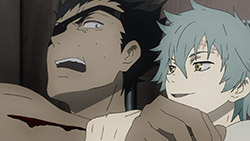 This problem hurt the development of Ganta as well. The manga utilizes the greater time at it’s disposal to tell us more about him – more background, more of his childhood, and his progression through the various stages of grieving at Deadman Wonderland takes much longer to develop. Some of the complaints against him are a direct result of the anime’s inability to really paint the complete picture, which is too bad. But with 12 eps, I don’t know how it could have been avoided.
This problem hurt the development of Ganta as well. The manga utilizes the greater time at it’s disposal to tell us more about him – more background, more of his childhood, and his progression through the various stages of grieving at Deadman Wonderland takes much longer to develop. Some of the complaints against him are a direct result of the anime’s inability to really paint the complete picture, which is too bad. But with 12 eps, I don’t know how it could have been avoided.
Here’s hoping we get a second season. There’s so much potential here, because you can tell even from the finale just how good the story is getting. It’d be a terrible shame to stop here, because we’d be getting an even better payoff for the stuff the anime did well. The emotions grow even stronger, the horror more spectacular, and we have more time with some of the best characters – Crow, Mockingbird, Hummingbird. It would be quite a thing to see.


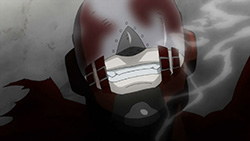
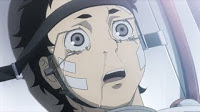
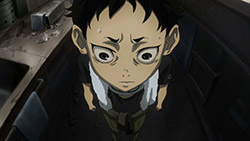
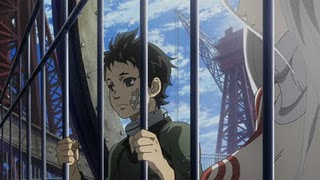


Prooof
July 3, 2011 at 7:48 ama very comprehensive review; the points you brought up really hit home with me, especially about Ganta, about the gore, the pacing.
"Getting pissed on by the Gods of Fate" — great summary of his situation, even though I've definitely complained about his weakness, both physically and psychologically.
admin
July 3, 2011 at 4:06 pmPlease, let's have a 2nd season. It would do wonders for Ganta's reputation!
TheWordsmith
July 19, 2011 at 8:34 amWas anyone else wondering if DW ending at 12 eps. has anything with Tokyo's infamous Bill 156 coming in to action. The only reason I am suggesting it as a possibility is the fact that in ep.12 it seemed like there was more rampant censorship of gore than previously in the series. Just a thought
admin
July 19, 2011 at 4:02 pmIt seems very unlikely, for two reasons. First, Bill 156 is aimed squarely at sexual content – violence (other than that of a sexual nature) isn't really covered. Second, the manga is out there and it's not like you see it getting yanked from shelves.
I think it's simply a question of DVD/BD sales. They aren't great, and that's a bad sign for a 2nd season.